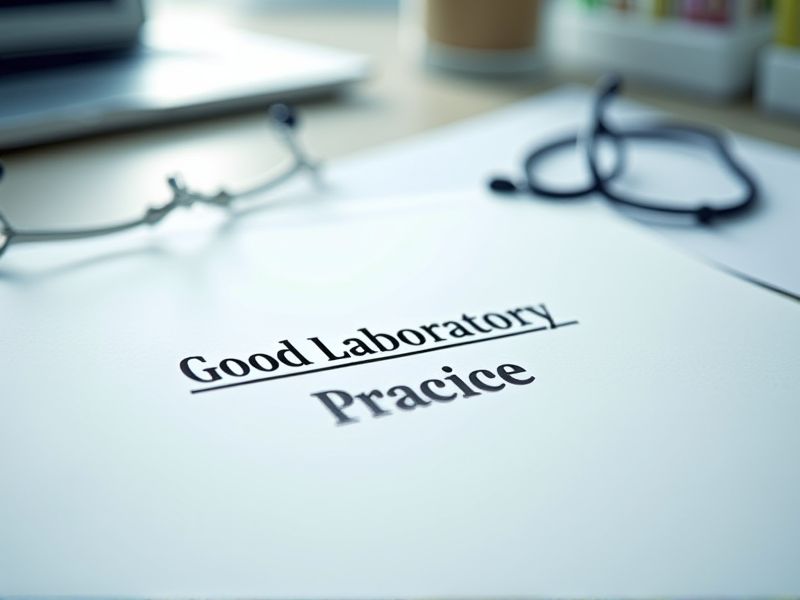
In the realm of laboratory settings, precision and compliance are vital, and the role of a Good Laboratory Practice (GLP) Auditor ensures these standards are upheld. Certifications equip auditors with the necessary skills to methodically assess processes and identify discrepancies that could compromise data integrity. Organizations prioritize these certifications as they demonstrate a comprehensive understanding of GLP guidelines, enhancing the credibility of laboratory findings. Essential certifications for a Good Laboratory Practice Auditor include the following.
Good Laboratory Practice (GLP) Auditor Certification
GLP Auditor Certification ensures auditors possess the necessary skills and knowledge to evaluate laboratory compliance with regulatory standards. This certification fosters consistency and reliability in laboratory audits, leading to improved safety and accuracy of laboratory data. Certification provides a standardized benchmark for auditor competence, increasing trust among regulatory bodies and industry stakeholders. Possessing a GLP Auditor Certification enhances career prospects and credibility within the field.
ISO/IEC 17025 Lead Auditor Certification
ISO/IEC 17025 Lead Auditor Certification is necessary because it ensures auditors possess a comprehensive understanding of quality management systems specific to laboratory environments. This certification equips auditors with the skills required to assess laboratory compliance with international standards, enhancing the credibility and reliability of laboratory results. The certification process also strengthens the auditor's ability to identify areas for improvement, promoting continual performance enhancement within laboratories. Proper certification elevates the laboratory's assurance to stakeholders that processes and outcomes meet rigorous quality benchmarks.
ASQ Certified Quality Auditor (CQA)
The ASQ Certified Quality Auditor (CQA) designation ensures a comprehensive understanding of quality auditing principles, crucial for maintaining Good Laboratory Practice (GLP). Possessing CQA certification validates an auditor's ability to evaluate a laboratory's compliance with established GLP standards, mitigating risks of non-compliance. The certification equips auditors with the skills necessary to identify process inefficiencies, enhancing overall laboratory operations. Moreover, CQA certification fosters trust and credibility with stakeholders, reinforcing the integrity of laboratory results and research.
FDA GLP Compliance Auditor Certification
Obtaining FDA GLP Compliance Auditor Certification enhances an auditor's understanding of regulatory requirements, enabling precise assessment of laboratory practices. This certification demonstrates proficiency in identifying and rectifying compliance issues, promoting accuracy and reliability in laboratory data. Certified auditors help laboratories maintain standards that both ensure valid research results and protect public health. Employers often prioritize certified professionals, valuing the assurance of compliance and reduced liability risks they bring to the organization.
ISO 9001 Lead Auditor Certification
The ISO 9001 Lead Auditor Certification sharpens one's ability to assess quality management systems, essential for ensuring laboratories adhere to high standards. Acquiring the certification ensures auditors possess a structured approach to evaluating processes, which is critical in maintaining consistency in laboratory practices. Certification enhances credibility, often leading to increased trust from stakeholders who rely on precise and accurate lab results. Familiarity with ISO 9001 frameworks provides auditors with the toolkit necessary for effective identification and mitigation of potential non-conformities in lab environments.
IRCA Certified Internal Auditor
An IRCA Certified Internal Auditor ensures that Good Laboratory Practice (GLP) standards are strictly followed, mitigating the risk of regulatory non-compliance and potential legal repercussions. Their certification validates competency in auditing processes, leading to more accurate identification of areas needing improvement. This level of expertise contributes to maintaining high-quality data integrity, essential for reliable research outcomes. Organizations benefit from reduced operational risks and enhanced credibility with stakeholders due to these auditors' adherence to globally recognized standards.
Certified Laboratory Quality Personnel (CLQP)
Certified Laboratory Quality Personnel (CLQP) ensures compliance with Good Laboratory Practice (GLP) standards, leading to accurate and reliable data. Their expertise helps identify non-compliance issues, preventing costly errors and ensuring research integrity. With CLQP, laboratories adhere to regulatory requirements, which enhances trust among stakeholders. Their involvement aids in maintaining high-quality processes, thereby improving overall laboratory performance.
Environmental Laboratory Accreditation Program (ELAP) Certification
ELAP certification ensures that laboratories adhere to standardized testing procedures, enhancing data reliability. Compliance with ELAP requirements allows auditors to evaluate laboratories based on consistent quality benchmarks. When laboratories maintain ELAP certification, auditors can confidently assess process integrity and regulatory adherence. Certification signifies a lab's commitment to quality and precision, assisting auditors in verifying Good Laboratory Practice adherence.
Hazard Analysis and Critical Control Points (HACCP) Certification
HACCP Certification ensures that a Good Laboratory Practice Auditor can systematically identify potential hazards in a laboratory setting. By identifying these hazards, the auditor can establish critical control points where risks can be managed or mitigated effectively. This certification also helps auditors assess the implementation and efficacy of control measures, ensuring laboratory processes comply with safety standards. As a result, the laboratory's operations become more reliable and safer, reinforcing public trust in the lab's practices.
Risk Management Professional Certification
Risk Management Professional Certification equips auditors with essential skills to identify and analyze potential threats that could compromise laboratory processes. Understanding risk management principles enables auditors to establish effective control measures, ensuring that laboratories meet stringent regulatory requirements. A certified auditor can apply risk management strategies to improve the reliability and quality of laboratory results, fostering trust in scientific findings. This certification enhances an auditor's capability to guide laboratories in proactively addressing risks, which reduces the likelihood of non-compliance and costly errors.
Summary
When you obtain certifications as a Good Laboratory Practice (GLP) Auditor, your competence and credibility in the field are significantly enhanced. Employers gain confidence in your ability to ensure compliance with established standards, which can lead to increased job opportunities. Your certified skills translate into improved audit processes and more reliable data collection in laboratory settings. Earning these certifications may position you for career advancement and potential salary increases.
